#there’s no narrator in the end of the skip button ending or in the epilogues which both take place in this windy dry desert
Photo

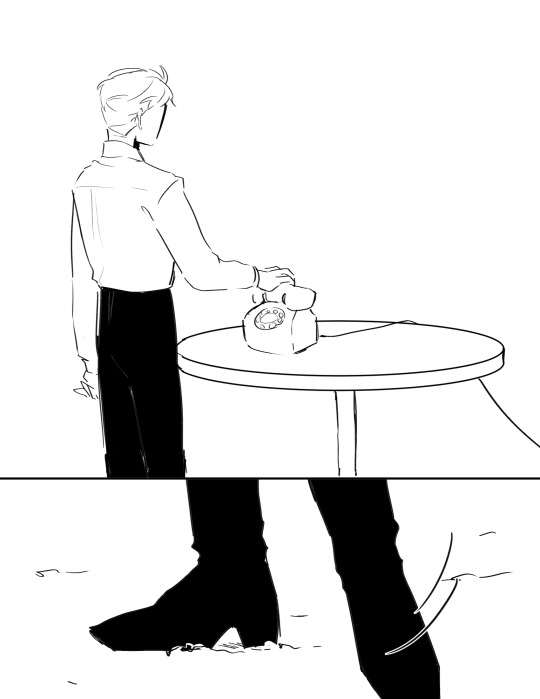
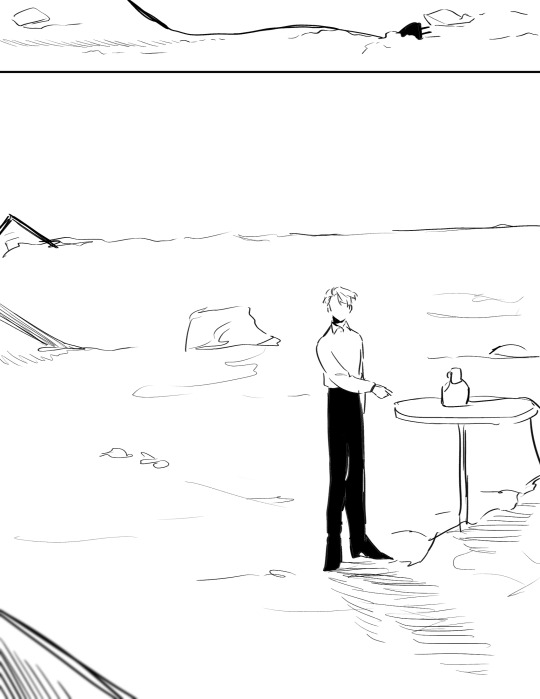
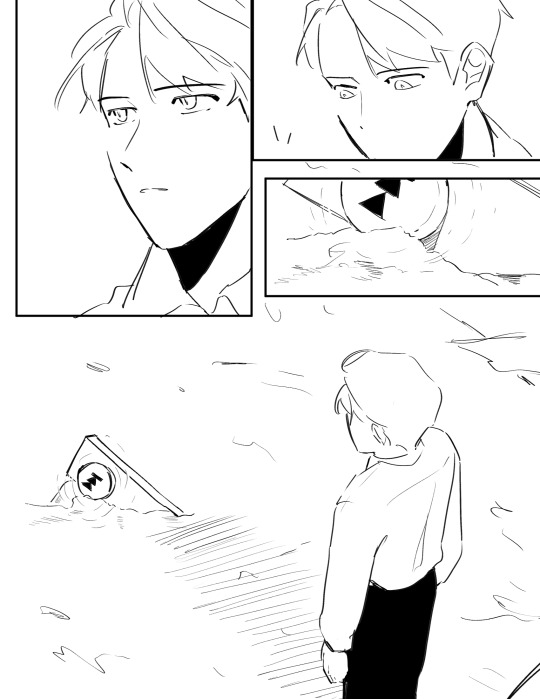
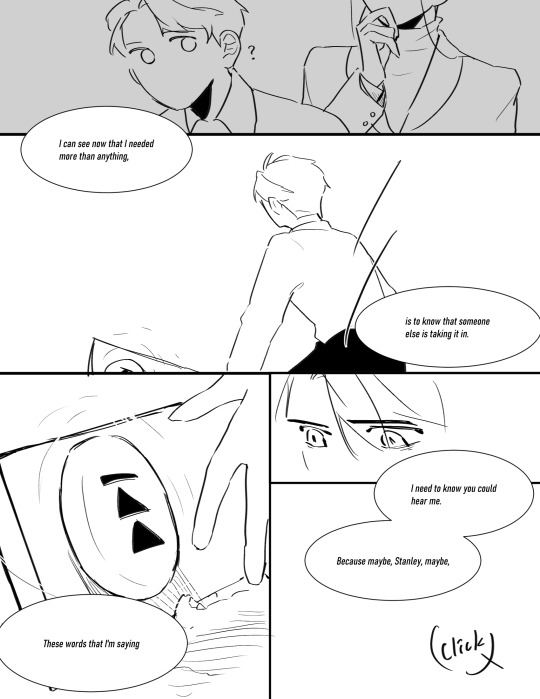



Restart?
song that inspired me: https://youtu.be/sKIZK8hF35w
#the stanley parable#the stanley parable ultra deluxe#tsp#tsp fanart#tsp narrator#tsp stanley#tspud#tsp comics#stanarrator#stannarrator#skip button ending#epilogue ending
2K notes
·
View notes
Text
Gay love is stored in the Stanley button
#the stanley parable#the stanley parable ultra deluxe#tspud#tsp#stannarrator#tsp stanarrator#stanley x narrator#narrator x stanley#tsp narrator#tsp the narrator#tsp stannarrator#tsp stanley#tsp shitpost#the epilogue killed me tbh#tsp epilogue#it's just that#the. the narrator made that#the epilogue clearly takes place after the skip button ending#so even though he hadnt spoken to stanley in billions of years (according to math) he still nade a button that says his name#and it says his name so tenderly#they are a tragic love story your honour#enemies to friends to lovers to strangers
80 notes
·
View notes
Text

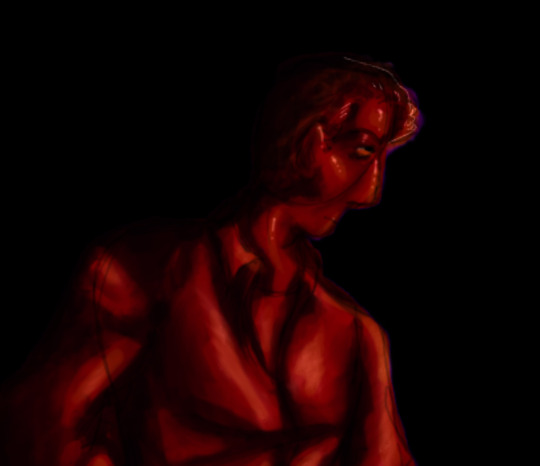
Lighting tests with the boys
#mild nudity#tsp#the stanley parable#Stanley’s being red and dramatic#because why not#narrator being in water has a bit more of an explanation#I’ve been rambling ab this to my friend a bunch but water is such a fun metaphor for The Narrator#I think a lot of times he could be compared to water#specifically I mentioned him being loud and overwhelming and crashing like a storming ocean#or his silence being cold and harsh like ice#and then later I realized that moments without The Narrator are most prominent in the desert#there’s no narrator in the end of the skip button ending or in the epilogues which both take place in this windy dry desert#because water can’t survive in the desert at least not for long#anyway anyway#I love the narrator did you guys know that? I love him so much#i have this like#5 paragraph long ramble in my notes app about human narrators relationship with water#I don’t think he’d like loud rushing water#(some sinks) (showers) (waterfalls) (etc)#I think it would overwhelm him a lot especially because he’s so new to being human#that’s why he’d prefer baths#ALSO SENSORY DEPRIVATION TANKS#he’d loveeeee sensory deprivation tanks bc not feeling this body reminds him of his form in the parable (no body only sound)#oh fuck I’m rambling again#ok ok bye fr this time#he’s also water bc I’d slurp him up🙏#.png
84 notes
·
View notes
Text
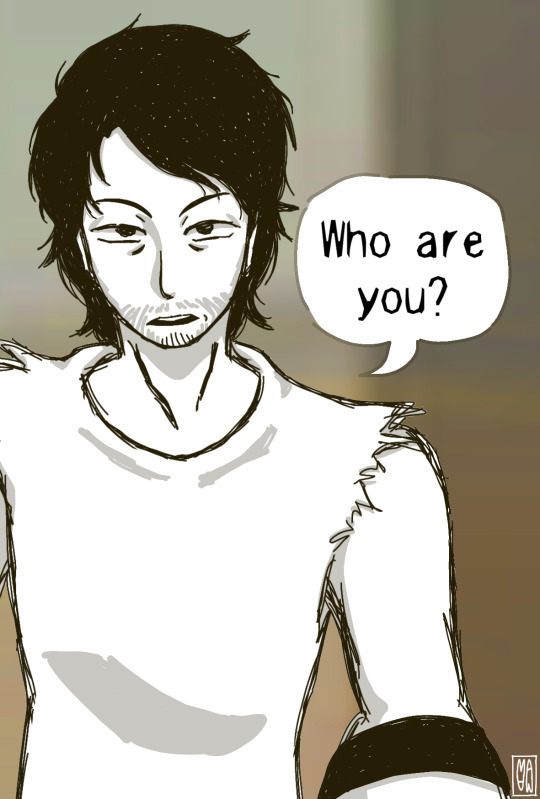

He finally caught him
#stanley parable#tsp#the stanley parable#stanley parable narrator#the stanley parable narrator#tsp narrator#the stanley parable stanley#tsp stanley#stanley parable stanley#stanley tsp#post skip button#tspud skip button#skip button ending#skip button#tsp epilogue#post epilogue#tspud epilogue#tspud spoilers#tsp au#tspud au
36 notes
·
View notes
Text
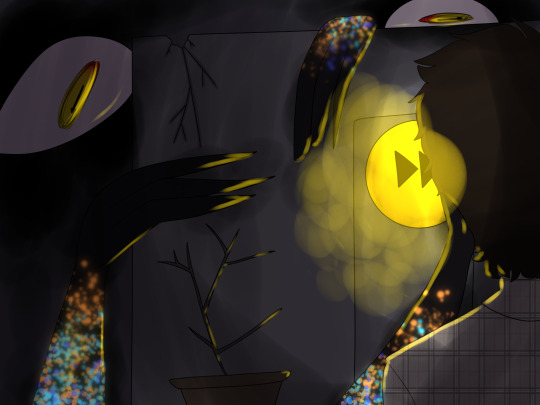
Started listening to As The World Caves In and woke up 40 mins later with this scribble in front of me
Flat colours under the cut
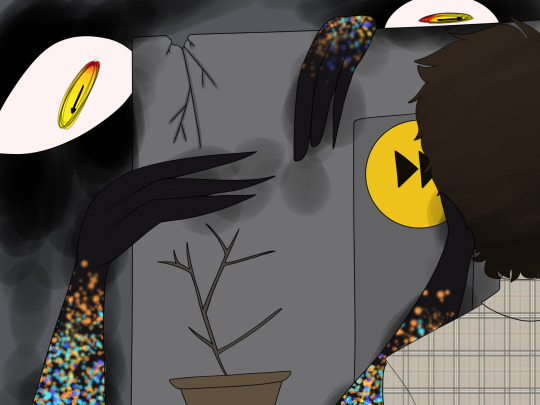
#dont have a proper narrator design but i got a general idea#anyways hiiii guess who played tsp#very heartbreaking it killed me and i hate it 10/10#(/j on that last one kinda)#scov.art#hiiii tsp fandom :}#the stanley parable#tsp#tspud#tspud stanley#tspud fanart#tsp stanley#tspud spoilers#tsp narrator#tspud narrator#skip button ending#actually the ending itself didnt make me inconsolable until the epilogue#granted also it always takes me a while for emotions and the such to hit so that might be it#anyways yeah. still focused on dmg content but i will be posting a lil bit of tsp#stanarrator#stannarrator
91 notes
·
View notes
Text
i'm remembering how the skip ending felt after i stepped out into the vast epilogue desert and the narrator's screaming voice was still echoing in my head, and then it reset and unfathomably -- unfathomably!! unfathomably!!! -- i was back in the office, the OFFICE, and god!! the narrator was doing its smug little thing, all of his coworkers were gone etc etc, and there was this pit in my stomach and all i could think was that he doesn't know how many times i've killed him
#WHEN YOU PRESS THAT BUTTON JJJNHKJKHHKKHHKHK#personal#starable#infinite years without narrator. INFINITE years.#and it really really feels like you (stanley) leave a part of stanley (you) in the desert#that feels like it lasts forever#(but there IS an end to it. thanks epilogue. not that it wraps things up in any conclusive way wait yes it does wait no it doesnt)#arrow don't look#the demo 🤝🏽 the skip ending#that feeling of 'you went through all that and then it fades to black and you're still here.'#let me wake up!!#i'm through with this dream!!! auuuuuuuugh
31 notes
·
View notes
Text
honest to God, there are literally only 3 things that will ever make me revisit the Skip Button Ending:
1. Needing to check details of it for my NEA - which I won't really need to do as the ending is burned into my brain (and not in a fun way)
2. Checking out the eventual Japanese subtitles, as I'm curious as to how they'll translate "the end is never the end". My bets are on 「終わりは決して終わり」
3. To just sit in the Memory Zone and chill for a while, before resetting. No need to visit the bad parts of the ending. Just sitting in the calm little nook of the game that the Narrator has shaped entirely to his liking.
#the skip button ending#tspud spoilers#listen i love the memory zone so so much but the second half of that ending just fills me with so much dread#god forbid i ever play the skip ending and the epilogue one after the other bc i will break down crying#like i nearly cried when playing the skip ending#and i did cry at the epilogue when the music crescendoed#so together? oooof#the stanley parable#the narrator#stanley
30 notes
·
View notes
Text
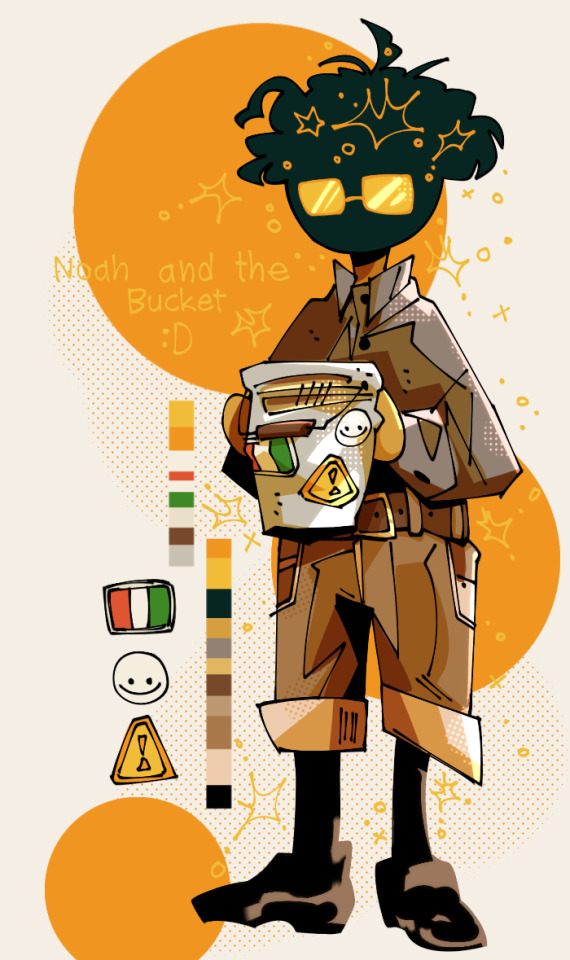
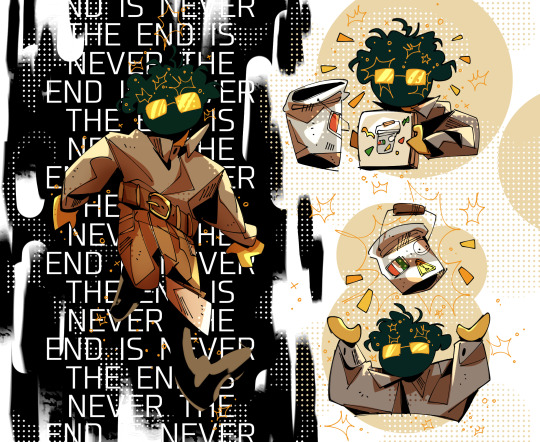
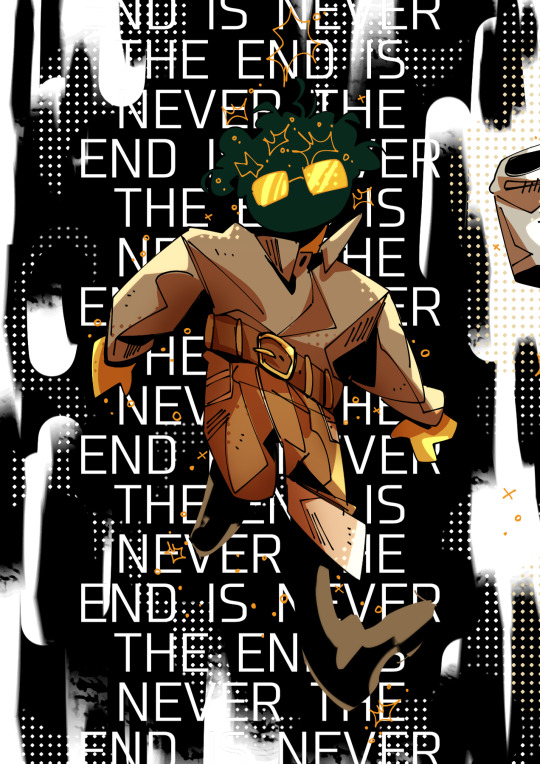
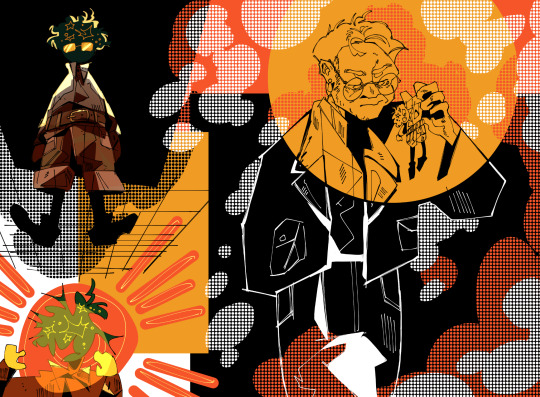
Hiii! This is my first time doing something like this, but I'm Noah (or 林武达) with the beloved bucket for @springbon-t-art "The Missing Coworkers" event :D
The favorite ending(s) that comes to mind first are endings like zending or the skip button. I just think it's really interesting when the game highlights how little authority the Narrator really has despite the role he tries to play. The whole game is how the Narrator can't make Stanley listen and just play out the story, like how there can be unreliable narrators or third person oriented or anything where the narrator isn't omnipotent. The Narrator is only as powerful as the story allows him to be, like how in the confusion ending the game can't handle the Narrator becoming independent and saying he isn't going to restart this time, so the game just automatically restarts and erases all of the Narrator's memories. The Narrator isn't even there anymore at some point in the epilogue and skip button, which could imply mortality or something to that degree. I just really like it when the Narrator becomes a character who is capable of developing despite how you're supposed to be the protagonist, but he's stuck being a passive character by virtue of the game's design.
He's just so silly to me, little British man who just wants his story to go smoothly
#the missing coworkers#tsp#tspud#AAAASIMSOEXCITED#the narrator lives in my head rent free with all the other little guys I've collected#the stanley parable#the stanley parable ultra deluxe#tsp stanley#tsp narrator#tsp bucket#art#drawing#digital art#artists on tumblr#sketchbook
221 notes
·
View notes
Text
TSP FERNATOR THEORY – THE ROLE OF NATURE IN THE STANLEY PARABLE
Oh gosh, I took this so seriously but hope someone will enjoy my rambling ;w; Just will say it here - this essay is game interpretation, it doesn't talk about Fernator AU (only mentions it).

Contents
0. What is Fernator AU?
“Stanley, this fern will be very important later in the story.” (Confusion, Bucket Destroyer & Figleys Endings – Fern)
“It's all out of my control now.” (Skip Button)
“Yes, I have something very exciting to show you!“ (TSP 2 Expo)
“And Stanley was happy.” (Outdoors - Freedom Ending and Memory Zone)
“The office could use a bit of decoration.” (Other plants in-game, Games Ending, Epilogue)
Conclusions
(Click 'Read More')
0. WHAT IS FERNATOR AU
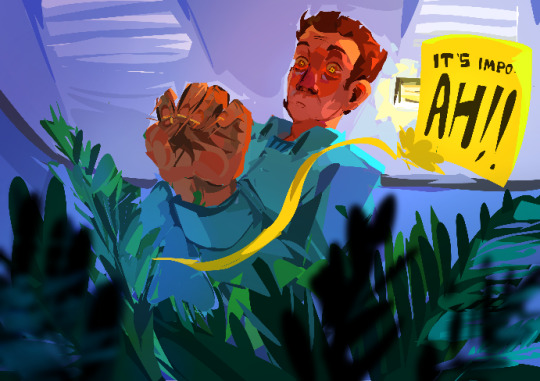
Fernator AKA Fernnarrator AKA Fernie is my TSP AU where the Narrator takes the form of the Fern and gets moved into the Bucket.
His form can change into any plant, either through a conscious decision or subconsciously, based on his emotions. While some of his flowers blooming can fit the conventional flower language, he creates his own based on his own bias for the plants.
The AU isn’t purely cosmetic – depending on his and Stanley’s relationship before the discovery of Narrator being the Fern, it splits into 3 main pathways.
Each one of them has different ending alternatives and on top of that, the AU has a linear story.
This post will NOT be focusing on Fernator AU - instead, it will talk about the plants of the Parable and my theories about their meaning. These do influence Fernator AU as a whole but I will leave AU talk for another time if anyone would be interested.
Instead, let’s talk about the two main inspirations for the AU: Fern and The Skip Button.
1. “STANLEY, THIS FERN WILL BE VERY IMPORTANT LATER IN THE STORY.” (Confusion, Bucket Destroyer & Figleys Endings – Fern)

This Fern is one of the few plants in the game and the only one mentioned in dialogue.
Its placement in the Confusion Ending is a set-up for a joke: something gets mentioned, said to have a big importance and then gets forgotten.
Maybe that was its whole purpose - a gag about misplaced foreshadowing or there is more to it.
A reverse situation is the Broom Closet – it can represent the “show, not tell” rule in storytelling where an object isn’t mentioned through text but more through actions. Narrator is displeased with that and on the third reset in a row after interacting with it, the Closet gets temporarily boarded.
That changes in the Bucket version– you can come in it as many times as you want and Narrator doesn’t get mad at Stanley (which overall is a theme in post-Skip).
So, these two are a perfect contrast:
Narrator doesn’t even mention the Broom Closet at first. However, it ends up getting new unique lines and gives long-term effects on the story (boarding the door).
The Fern gets mentioned in the story but doesn’t show up later in the ending.
However, the plant does appear in the alternative of Confusion – the Bucket Destroyer Ending.
“We're the ones that matter Stanley! Classic characters from the first game.”
Each of the objects in this picture symbolises a person in Stanley’s life:
the Broom Closet = Player, since in the original version, if you stay longer, Narrator talks about them;
the pencil sharpener= 432 – in lore, madness through never being given a pencil to sharpen;
Stanley’s computer= Boss, due to the orders;
Wife mannequin;
Baby cut-out (might also represent Stanley’s kids);
Adventure Line ™ – it isn’t a person but is said to be conscious;
and the Fern.
(EDIT: Beau in Stanarr server also said that the mugs on the table could symbolise the Employees while the Baby could be The Essence of Divine Art. That could potentially mean that Adventure Line™ could also symbolise curiosity - just like, while TEDA seems to be a conscious being, might just be human creativity. )

We already have the Line ™ from the Confusion Ending. Other objects could have been used for this scene but somehow, it is the Fern that ends up being showcased. It could be just due to it belonging to this pathway but it could be also something else.
“You see, your friends and I are concerned for you, Stanley.”
He could be meaning himself just as the voice – after all, the separation between him and his friends is not that uncommon. He does use the word ‘friend’ positively only in the UD version of the game. He calls Stanley his friend only once and then, proceeds to call the Bucket and Stanley friends a few times, making it obvious the man projects on that object.
Here though, Narrator is against the Bucket - so, why couldn’t he start to project on something else? That way, he could visually show the group of friends with himself.
So you know,,, Fernator real,,, maybe,,,,,,,
(Big thanks to Chris from Crowsx3 Discord for reminding me about this next part)
I was also reminded that Fern makes one more appearance - in the Figley Ending, Confusion Ending room.

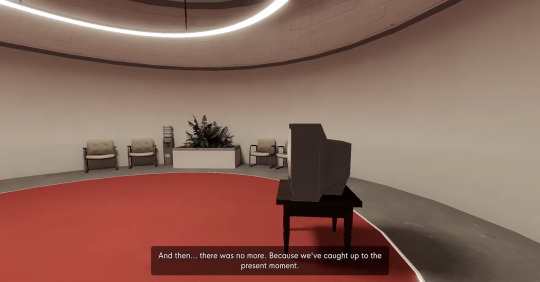
You get to this room after a Red-Blue door choice that doesn't matter at all, leading to an open door. It perfectly blends so many parts of the game together - the choice between two pathways, the illusion of the choice and also brings something new - backtracking.
In most of the game, we are unable to do so - the doors close behind us and that's it. But, just like in Confusion - Narrator wants to backtrack, to change the pathway, for one last adventure with Stanley.
Maybe that was the importance of the Fern. For it to show up when Narrator wants to do something fresh, something new, WITH Stanley.
"Oh, I want more memories, Stanley! I want to keep going!"
In the end, he wants to retire and move on. If he does and only leaves his recording, if he stays with everything TK has done - that's up to a debate for another time.
But one thing is known - we all remember the Fern, even if it doesn't heavily impact the story.
Unless you know - Narrator took the form of it and then-
Ok ok, but this was the nice task – now let’s talk about The Skip Button.
2. “IT'S ALL OUT OF MY CONTROL NOW.” (Skip Button)
I will talk about the Memory Zone later – here, I want to focus solely on the Skip Button room.

The Skip Button plant is the only thing in the Parable that shows actual ageing. Sure, there are some other symbols of time passage - i.e. clocks, and scratches on objects but nothing else shows decay besides this one single plant.
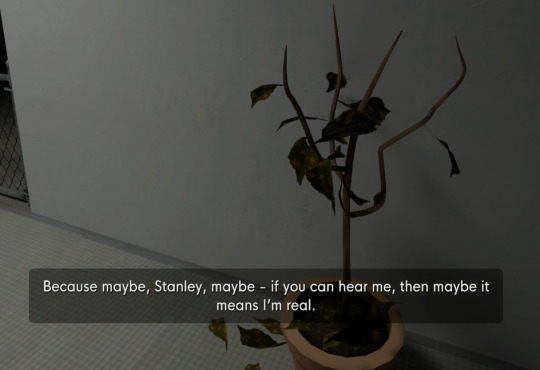

Changes happen in Skips #5 and #6.
In Skip #5, Narrator says it’s been a week or two.
I know that people have done the math on how much time passed through each skip takes but we will base it only on the plant alone. While a week is too short for a plant like that to show signs of severe dehydration, 2 weeks is more plausible.
In Skip #6 - when he says he had stopped counting once it was over a year - the plant is dead.
Death is overall a bit of a theme in the Parable – the Countdown, Museum, Apartment and Zending especially have a lot of lines about Stanley’s death, which should cause permanent effects. Instead, the game just resets, not making any deal about it.
This plant, however, does not return to its original form.
In Skip #13, concrete falls on it, leaving the plant trapped for the rest of this pathway.
I think the room overall (together with the plants and the clock) symbolises Narrator’s psyche.
The first few Skips are alright for him - sure, the time in-between seems to grow but he still thinks it is a good idea. He starts to panic and begs Stanley not to press the button in Skip #4 and in Skip #5, both the plant changes and the lights dim down. This is when he has been left for those two weeks all for himself and just sounds so tired - and with each skip, another part of his psyche breaks.
The clock stops working and falls around #8 and #9. It’s still long since in #6, Narrator where he says he lost count but he might have just exaggerated it, only losing it in these runs.


After such a long period in solitude, any mind would start to decay - the plant, the pipes letting the water escape through them, the fire alarm going off (since batteries are low), the walls getting destroyed with time… Together with how silent Narrator gets at times, I genuinely believe this whole section is us being in his brain.
But then in Skip #15, (after the sunlight in #14) this happens:

These skips are special because they are a glimpse of hope. Sunbeams, birds chirping, new life in the form of plants showing up – just for it all to disappear next Skip.
While the last time we hear Narrator talk is in #11 (The end is never), this feels like he is trying to talk to Stanley indirectly. The destruction of the ceiling feels like an attempt to break Stanley free, which, unfortunately, was a bit misplaced since we don’t have the jump option (curse you, jump circle for gatekeeping them / silly).
These can mean several things.
Narrator hopes that the situation would soon end, as mentioned in the previous part.
It could also show that he is making new ideas and growing. I think it would be a poetic way of personal growth. It is visible in the Bucket version of the game - lack of Red-Blue doors, Countdown becoming silly birds ending, him calling Stanley his friend through the bucket - he wants to change for the better.
“You are not beyond redemption. You may change, and you may become more, so much more than you were before.”
And what better way to show that than through physical growth?
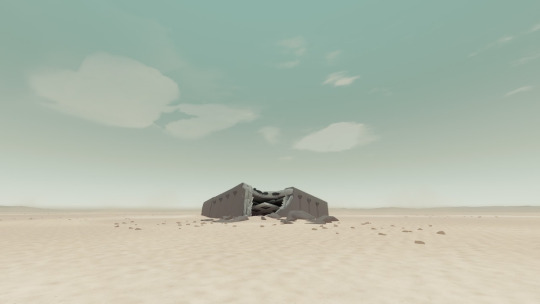
Even if his mind, in the end, becomes the sandy landscape we all know - he had tried to get better and, in some way, succeeded.
I sometimes wonder if the New New Content & Bucket parts of the game are what Narrator wants to turn the game into during these Skips. How he wants to acknowledge Stanley, show that he cares for him and that he matured.
But, let’s go back a bit. The New New Content happening during these skips in Narrator’s mind are a cute theory but, it’s just that - a theory.
What is real though is the game content, like the plants in the TSP 2 Expo.
3. “YES, I HAVE SOMETHING VERY EXCITING TO SHOW YOU!“ (TSP 2 Expo)

This part alone has 4 new plants that were never seen before in the rest of the office (they later make an appearance again in the Bucket Apartment Ending).

Three of the plants have some resemblance to the one in the Skip button - a long office plant put in a pot, while the smaller ones seem similar to the Fern.
(Small note: these plants are based on real-life ones that are common in offices and are low maintenance but I am too tired to figure out their types.
Possibilities from a bud: “the first one in the basket is prob Dieffenbachia Seguine, down in middle is calathea makoyana, low right kentia palm”. )
Interestingly, the whole Expo is red-themed so, to compliment that with the opposite colour - green - could seem like it’s a bolder move. It to be fair isn’t - there are a lot of greys, whites and browns that tie everything together, not letting this become a Christmas-themed event.
Expo gives us a lot of new and fresh Narrator ideas - the Bucket, Figleys, and Infinitive Hole. I think these plants also deserve a mention - they all tie perfectly to the theme of Narrator’s growth.
He wants to be better, to please Stanley and I think, maybe, to fit in more. He could have reused the same plant from the Office but no - he made new ones.
And just like the Broom Closet - they never get acknowledged in the dialogue.
Show, not tell.
4. “AND STANLEY WAS HAPPY.” (Outdoors - Freedom Ending and Memory Zone)
Stanley felt the cold breeze, blablabla, you know the drill by now. Most of us will remember the current Freedom Ending - lots of grass, some trees, blue sky…
But that wasn’t always the case.
The 2011 Mod had a way different ending screen.

The difference is probably due to the limitations of this being a mod but comparing it with the future renditions, it might portray how Narrator had gotten softer throughout the games.
In this one - the outside world is urban. You went out of the building you were mind controlled in into a town of some sort. It doesn’t look too appealing. Trees without any leaves, very short grass - it is SOME freedom but it feels rough. Just like the only other outdoor area in the Games Endings (more about it in the next part).
The newer versions, however, are WAY different.
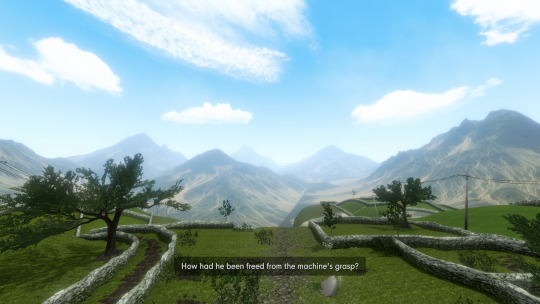
More saturated colours, some rock roads, trees, and mountains in the background - nature is ALIVE and well. Just like Stanley is, being freed, in Narrator’s eyes.
Because it is Narrator who chose to make this the end screen. It is just visible, time and time again, how much this man adores nature. Sure, he might be scared about the open world (next point, again) but he could have just remade the buildings from the original. But he chose not to - instead, upgrading it into something more beautiful.
This isn’t just an ending for Stanley - it’s an ending for HIM.
I think that’s why Memory Zone is just so similar, in my eyes, to Freedom in this aspect.
“(...) I made something special and tucked it away here where the game’s developers won’t find it.”
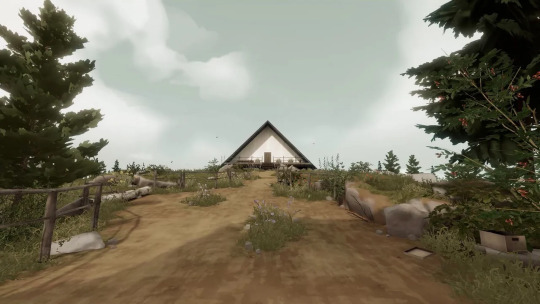
Some things do not match - the tree types seem different, the sky is a different colour, and small flowers pop here and there that aren’t in Freedom.
But there is a key element that does match - mountains.
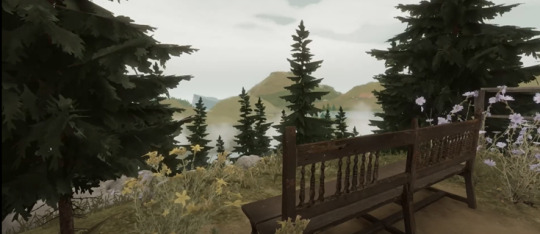
These two areas may be connected - Memory Zone seems to be on a higher standpoint, maybe on a hill rather than a mountain but due to just that, it is possible they are both connected, just in different parts of the world.
Memory Zone is special to Narrator - it is supposed to show his achievements and happiest moments. It would make sense that it was placed in a similar area as Freedom - just hidden so that the other game developers Narrator mentions, would not influence it.
The Maintenance area of the Memory Zone, however, is everything Narrator tried to repress. That is why he might not remember the reviews in there - it’s all hidden in his subconsciousness.

“I don’t recall this part of the Memory Zone before.”
Narrator had been probably working on the Memory Zone way before he shared it with Stanley. It was his safe space, or so he thought. The memory in the name seems to be the most important clue - it’s not like some remembering zone, history zone or something - it’s memory.
And memories like to get hazy.
As I mentioned - to me, Skip Button's room is a visual representation of Narrator’s mind, at least a part of it. And since it’s a part of this area - I headcanon the whole Memory Zone to be that.
Contrasting with the wild flora of the main Memory Zone, the maintenance seems very run down and secluded. The colours in Memory Zone are already desaturated in comparison to the rest of the game but this part looks dirty thanks to the focus on browns and greys. While some of the lovely nature is in there - birds, a big water pool, the trees are dead.
These dead trees, just like the Skip Button tree or 2011 Freedom Ending ones might be a pattern for Narrator when he is not in his best shape.
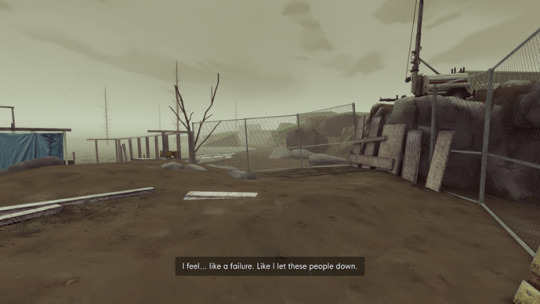

Once again, the game shows just how important the nature aspect seems in the key part of the story. Narrator made the conscious decision to change the Freedom Ending and probably also had some saying about the Memory Zone, until the parts he wanted to repress that got run down.
Narrator keeps on repressing things a lot throughout the game. He shows denial and shifts the blame - on Stanley, the Player or the reviewers. At the end of it all - during Skip - he finally realises his flaws and mistakes.
But that realisation happened way too late.
Maybe that’s why he later tries to separate himself from that Memory Zone, putting it in the Executive Toilet.

Or maybe, it’s some not-so-hidden poop joke. But that’s not as important.
So let’s get to the rest of the game.
5. “THE OFFICE COULD USE A BIT OF DECORATION.” (Other plants in-game, Games Ending, Epilogue)
Besides Fern, there is another plant that keeps on being with Stanley a lot. It is there, never in the foreground but it’s always there. It’s like a hidden companion - maybe, as a symbol for not so hidden one.
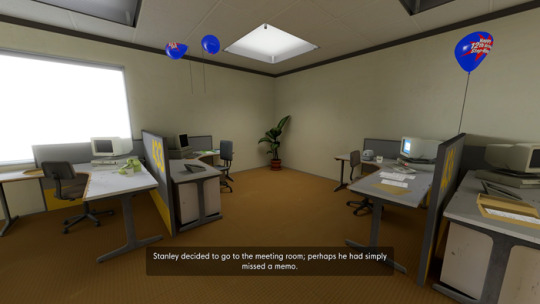
This plant shows up in most of the Left Door pathway to the Boss’s Office - 5 times in different rooms:
desks 431- 436,
desks 418-424,
left-right door choice,
Meetings Room,
and the entrance to Boss's office.
It also shows up in rooms we see around the pathway:
room with 456, 457 doors,
413 room,
Executive Bathroom
and two in the room with Elevator Music.
The plant shows up 4 times in Confusion Ending (including the earlier mentioned 456, 457 area)- and thinking how the Fern is also there makes me just feral. Narrator joins Stanley on his little adventure through the unknown territory - so he inserts himself in the story.
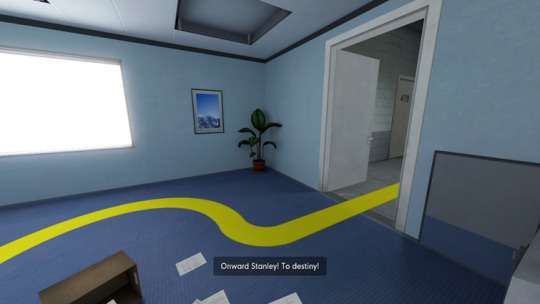
In the Right door pathway, we get through the first 3 from the Left door and 2 more - the Loungue and the Games Ending.
The Games Ending has very different alternations between the game version but one thing is stable - nature in the open words games.
“I wonder what he found.”
In 2011, once again, nature is quite dead and dried up. RIP all the plants in this version of the game.
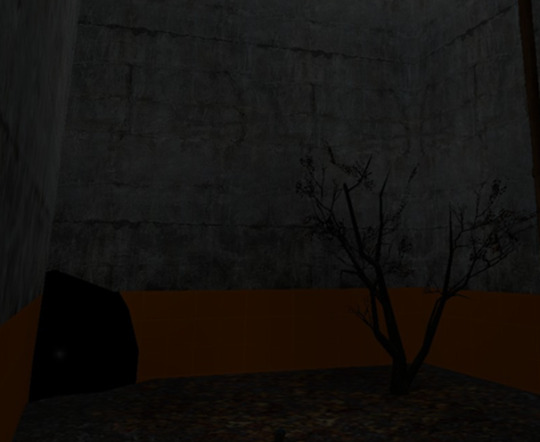
The next alternations, however, take a different approach and make the plants more alive.
The 2013 version uses Minecraft as it outdoor area.
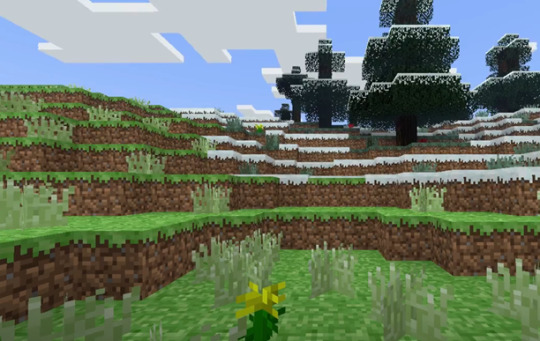
Narrator doesn’t focus at all on the nature aspect - more on the crafting one which is fair, he is a storyteller and a game designer.
In Ultra Deluxe, there are two areas - Rocket League and Firewatch.
Rocket League won’t get that much attention from me - it’s just a typical grass for sports fields.
The Firewatch, however, is a direct parallel with Minecraft. And it’s due to it being open-world.
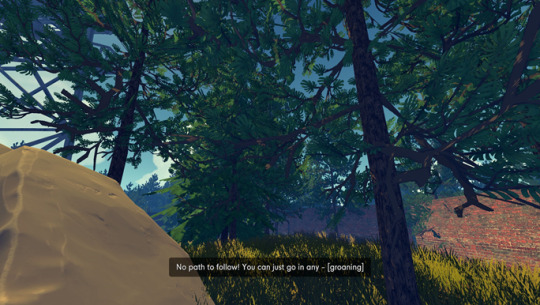
This brings me to the last issue with Narrator and nature - he likes it quite a lot, but it HAS to be limited for Stanley.
Freedom makes you stuck in a cutscene, you can only go to mines in Minecraft due to no jumps, Memozy Zone has barriers, so Stanley has one path to follow, and most plants are potted-
expect, for one thing.
And it’s the plants that show up in Skip #15.
I think it’s no coincidence that in the Bucket runs, the Red-Blue choice is off-limits. I think it’s due Narrator not wanting to go through things that hurt.
But they hurt not only him - they also hurt Stanley.
We could focus on the fact that each of the Games runs ends up with Stanley being trapped in the 2011 version.
But I think that lack of freedom to explore beyond the main area - the set path, the game, is what got Narrator more, in the end. Maybe he is scared about full freedom and lack of full control over the story and Stanley.
And maybe that’s why the Epilogue seems to be a never-ending desert. It’s Narrator’s last attempt to give Stanley the true freedom they both needed.
“An epilogue would be fun. Wouldn’t it, Stanley?”

(Shoutout to a Rammy who gave me the idea to talk about this screenshot.)
The desert, for me, fits the Sandman story (no, not just the song though now it is playing in my head so I hope it will play in yours, too). It shows up at the end of the Skip run and just like the room itself, I think it keeps on symbolising Narrator’s mind.
Once a mindflow, where his thoughts could drift anywhere they pleased became quite stagnant. He fell in hibernation or the mind was just no longer there.
The Sandman brought him the sand and let him rest, cope with the near eternity of solitude.
And to think, during it, Stanley uses wood he finds in this place to bring some light. Lighting up the neurons that still are active.
And this one last time a plant in any shape is present - it is there to serve Stanley.
Narrator, I see you. You probably never left because you are unable to but, you still care about Stanley.
And we care about you.
6. CONCLUSIONS

(painting in the background: The fairy grotto, 1867)
I could mention EVERY single plant in-game: all the nature paintings, plants in Demo and all the Infinitive Hole nature backgrounds, apple in Pink room, try to get through every plant and try to find its significance but at the end of the day-
this whole thing is over 3k words IOSFAIHOSAFHIOFSA
I know this post didn’t talk much about Fernator. I could talk about how Narrator’s need for control and being in a confined space makes him want to be in a Bucket that he also projects a lot onto. How plants often symbolise his psyche, show up in important parts of the office and as the only other visible living being besides Other Stanley and Mariella, maybe, just maybe, Narrator, who seems to not be human, might have decided to take such form, for comfort and safety. But I will leave that for another time.
So if you reached this point, I hope you realise that Fernator AU is a superior AU to the point it’s canon /silly/nsrs /j (,,,, or is it / silly)
If you are reading this - thank you so much for reading this ramble or just skimming through it. I do appreciate you.
Thank you and-
“I'm out... I'm out... I'm done! It's over! Thank you for playing! Your input was extremely valuable.”
#my ramblings#TSP#TSPUD#Ultra deluxe#Theory#The Stanley Parable#Plants#Bucket#Infinitive Hole#Fernator AU#Skip Button#Nature#theories#Epilogue#Adventure Line#Wife#Baby#Broom Closet#Confusion ending#bucket destroyer ending#memory zone#maintenance#cookie9#games ending#firewatch#minecraft#2011 mod
240 notes
·
View notes
Text
Ok here’s a list of why stannator is canon by me
- “Stanley kissing” tab in an official video
- Kevan tweets. Just Kevan tweets.
- Having to be bound to escape the parable (escape pod ending)
- Literally soulmates (escape pod ending… again)
- “I could hug you, oh, I could kiss you, but Im just a voice in a video game”
- “WE DID IT!!”
- All the voice lines that make him sound swoony
- Dink dunk email “gay, r u gay?” On narrator interview
- Narrator is literally willing to risk his life for Stanley
- There’s proof he remembers resets
- Bonus + he gets a bucket just to reassure Stanley bc he has anxiety LMAO just like me fr
- Just the two of us poem at the bottom of the infinite hole
- Skip button ending
- Zending dialogue
- Crows crows crows retweeting art of them in pride month (??)
- Memory zone English translation song “my love, I want to stay with you, just like this, in the Memory zone” and it was written from the Narrator to Stanley
- Ability to change the beginning title to “forbidden boyfriends” or the fact the boyfriends option is even there after the epilogue
Let me know if I missed anything!
#stannator#stannarrator#the narrator the stanley parable#the stanley parable#the narrator#gay#yippee moment#stannator is canon#kleeandtokokirigayasolo
270 notes
·
View notes
Text
Why I always want to Figure this out
That's what I'm thinking about the timeline in TSPUD:
TSP→Confusion ending→TSPUD(new content)→Narrator felt disappointed to the new content→new new content(The Stanley Parable2)→Memory zone(The narrator wants to remember the past)→ skip button→Narrator ending(The narrator remembered everything during the long wait, and the figley is a figurine he made up in his mind, symbolizing his lost memories)→epilogue
20 notes
·
View notes
Text


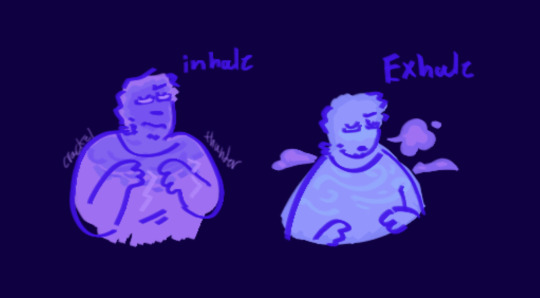
Have I ever posted my Water Narrator thoughts?
For a while, I’ve thought of the use of Water as symbolism for The Narrator, in and out of game context
I think these thoughts are most reasonable when looking at The Skip Button Ending and The Epilogue. In The Skip Button ending when The Narrator first sees a bad review they (Stanley and The Narrator) go outside to see that it’s starting to rain. This continues the duration they spend outside, The Narrator’s stirring mind evident by the distant thunder and as we get closer to the edge of the land we see a large ocean. And what rises out of it? The Narrator’s newest creation, The Skip Button. With this all happening it wouldn’t be outlandish to associate The Narrator and the water outside. Once Stanley’s inside the concrete room we are taken away from the water over time. It dries up along with The Narrator and at the end of those many years we’re left with a tundra; a desert that hasn’t seen water in years. And The Epilogue doesn’t dispute this, the only life we see being Stanley and TK
More into my personal thoughts, The Narrator is vast like the ocean we see. All encompassing; he surrounds his story (a comic I made that slightly echos these ideas).
It rains when he cries, it boils when he’s angry, the clouds fly as he breathes
I talk ab this a tiny bit more in the tags of this post (warning: he’s a bit naked) (ignore the last tag um)
#tsp#the stanley parable#the stanley parable ultra deluxe#tspud#rahhh#this (he) is always on my mind I don’t know how I haven’t made a proper big post ab this#I need to make more pieces of this too#I’ve had this idea for a while connected to this#about my post parable au#(I hope) I’ve made it clear that The Narrator has a very difficult relationship with water now that he’s human#over time I want him to slowly become comfortable with it#I want him to at first barely be able to bare touching it#but as he grows and becomes human he learns to love it#because as a human being he’s 60% water#he’s got to accept it because technically it is himself#it’s very late I don’t know if any of this makes sense#anyway! love y’all <3#.png
168 notes
·
View notes
Text

Emotion Booth | Songs for Stanley, the Narrator, and many of the endings.
An expanded ver of the original fanmix, because I finally got to play TSPUD and it permanently rewired my brain the same way TSP did way back when. Happy 4/27; Let's Begin Again.
▶Listen (Spotify)
(tracklist & annotations under the cut)
[SIDE A]
1. Existential Crisis Hour! (Kilo Kish) [Intro/Confusion Ending]
2. Watch the Show (M. Ward) So tomorrow on your way into work, who will be wearing the emperor's clothes?
3. Soundproof Box (Ami Saraiya and the Outcome) Living behind these walls it feels like living in a soundproof box.
4. You're Alive (ANIMA!) [Apartment Ending] Sidewalk walkers, empty vessels, task completers / Go through the motions, keep repeating.
5. In the Glass (OK Go) [Real Person Ending] I tried to call out to him but the glass was perfect.
6. A.A.A. (Squalloscope) Can you do me a favor? Can you give me one cent for everything that doesn't make sense?
7. Crazy (Gnarls Barkley) [Mariella Ending] I remember when I lost my mind / Even your emotions have an echo in so much space.
8. Vein of Stars (The Flaming Lips) [Zending] They'll glow from above our heads / Nothing there to see you down on your knees.
9. Vertigo (The Guggenheim Grotto) [Powerful Ending] It's not that I fear the fall or crushing my bones / I fear the desire to heed the call of that unknown.
10. Humpty Dumpty (AJR) He said, "Screw it, I'mma smile right through it, and I'll scream when no one's around."
11. Why (Andrew Bird) Why'd you do that? You shouldn't have done that.
12. Complaint Department (Lykke Li) [Countdown Ending] Me oh my your luck seems to be no more / If you want to complain, I'm not the complaint department.
13. The Cruel, the Kind and the Bad (Psapp) [Museum Ending] He's taken all your best years away, but he's all that you can find.
14. The Great Escape (Patrick Watson) [Escape Pod Ending] Looking for a way home, looking for the great escape.
[SIDE B]
15. Good Old Desk (Harry Nilsson) [intro]
16. Honest Feedback (Saint Motel) Of all the illegal ways to take someone's life, there's one just as sharp and it's sharp as a knife / it's called honest feedback.
17. Longform (The Dodos) [Theme for the Memory Zone] To place an installation now for all to come and bring what they think about.
18. Eight Seven (Psapp) Though I call you won't reply / You watch me rooting through each door, you watch me lie.
19. Alive Alone (The Chemical Brothers) [Skip Button Ending] No way of knowing if [he's] ever coming back.
20. Here for Good (Jason Lytle) [Epilogue Ending] I'm here for good.
21. X-Rays (Gomez) We didn't turn it on, but we can't turn it off.
22. Since I Left You (The Avalanches) [Freedom Ending] Since I met you, I found the world so new.
23. The End Has Begun (Loudon Wainwright III) [Figurines Ending] We've been here before, you know the signs / The looks and the language, the gestures, the lines.
24. Helplessness Blues (Fleet Foxes) What's my name, what's my station? Oh, just tell me what I should do.
25. Lonely Town (Vulfpeck) He's the mayor of lonely town, population: one.
26. Hallucinating - Mariachi Ver. (Elohim) [Theme for the Infinite Hole]
27. ICE CREAM FEVER (Tomoyuki Tanaka, FPM) [Secret Disco Ending]
#the stanley parable#the stanley parable ultra deluxe#tsp#tspud#tsp stanley#tsp narrator#fanmix#playlist#quick repost since I managed to get back before 4/27 was over in my timezone ayy happy stanley parable day
20 notes
·
View notes
Text
ozzies long-ass TSP ramble
For context, a few days ago i was in a thinky mood when i watched this video on Valve catwalks. it mentioned death of the author, and while ive heard of it, I didnt understand what it meant until after the video explained it. So i got thinking.
the following was a series of messages I sent to my friends on a discord server im in (with the exception of the last part bc i just thought of it now even tho im sick) that i compiled for yall into sections so its easier to read.
these are just my thoughts and could be totally wrong, i just wanted to share aksjdh :P (plus this is my second time im posting this so there might be some inconsistencies)
(ramble under the cut so yall dont get a massive wave of text on your dash)
"smth smth death of the author smth smth reviews smth smth interpretations smth smth skip button"
like idk if this was obvious to everyone else n im just finally getting it or not, but the skip button ending being about the narrator seeing the negative reviews causing him to create the button in order to appease them, which said reviews ended up making him believe he was being preachy and obnoxious and unfunny, but as a result, he ends up believing it and trying to appease those interpretations rather than be more confident of his dialogue and what it means to him(whatever he may believe) and ending up dying at the end bc of it being a kind of literal version a death of an author of sorts
---
im just thinking about how timekeeper/settings person/432/whatever is really only interested in the player, but not stanley himself. and if the narrator ends up dying (or decaying at least in my interpretation) during the skip button, could the same be said about stanley as a character as well?
like we never see stanleys model as us, we dont see his feet when we look down, and the only time we see him in game is either as a hand during the bucket escape pod ending, the mariella endings, and the not stanley ending. and the last two are cutscenes. for all we know, stanley could have died at some point during the skip button after the narrator did and we would never know bc we cant see him
but since 432's desk being at the end of the epilogue which happens post skip button ending, i would have said that was the first time we ever see him interact with the game internally rather than asking for the time. but i do remember someone suggesting that the timekeeper was the one who removed the door in the skip button in order to kill the narrator off and get stanley/the player away from him in order to talk more
with that thought in mind, that would mean TK had to kill stanley and the narrator off in order to be able to lead the game, push beyond the barriers of a narrator and character and just talk to the player, one on one
---
it makes me wonder if what the curator said in the museum ending holds more weight
like, she talks to the player as well. both she and TK talk to the player themselves instead of stanley the character. and when she says "When every path you can walk has been created for you long in advance, death becomes meaningless, making life the same. Do you see now? Do you see that Stanley was already dead from the moment he hit start?"
stanley's function is a character in the narrators story, a literary device to propel the game forward. the narrator makes the race track, and stanley drives. without the narrator where would stanley go or do, without stanley who would move the story along?
"Can you see? Can you see how much they need one another? No, perhaps not. Sometimes these things cannot be seen."
and yet, hes dead, just like the curator said. because no matter what, he's never going to be able to truly make his own decisions. the confusion ending lays out how all the endings are scripted despite what the narrator believes and acts, its all predetermined.
and in a sense, the narrators dead too. no matter what stanley tries to do to change the story, or the narrator changes to the game in order for stanley to react to, its been planned long in advance for the eventuality. every word, every event. and with stanley's deaths, it ends up just bringing them back to the beginning again, "What exactly did the Narrator think he was going to accomplish?" if they always come back to the same preplanned paths, to the illusion of free will, it doesnt matter regardless. death doesnt become a statement, it becomes an inconvenience.
"But listen to me, you can still save these two. You can stop the program before they both fail. Push escape, and press quit. There's no other way to beat this game. As long as you move forward, you'll be walking someone else's path. Stop now, and it'll be your only true choice."
The only way to save both Stanley and The Narrator is by not letting the story play out to begin with. To beat the game, which means to let the game end after you win.

and yet,
the end is never the end is never the end is never the end is never the end is never the end is neve-
In a game where there is no ending that stops the game in its entirety, where everything will keep on happening again and again and the end is never the end, the only way to beat it is to make a choice as yourself the player, not stanley the character.
because he doesnt get a choice, the narrator doesnt get a choice. they think they do, but they dont. the only way to beat the game is to not play it. (which makes sense given that there are achievements involving not playing the game in both the 2013 HD remaster and 2022 Ultra Deluxe)
both Stanley and The Narrator are two sides of the same coin that make up The Stanley Parable, and the only way to use the coin is to give it away.
maybe thats why the true ending of the game with credits and stuff like that, is the Not Stanley Ending.
You the player have successfully broken the fourth wall from the outside in, even though that ending was planned like all the others (ie, the game allowing you to disconect the phone), you break the illusion of being stanley the character, which the game ends up booting you out of stanley as it cant handle the "narrative contradiction".
maybe thats why the escape pod ending has the sign that reads "both the player and the narrator must be present in order to leave". its not stanley, its the player, us.
maybe thats why that ending is one of the most cruel. the only way to get there is to leave the narrator trapped in the boss' office. there's no way to get him to the escape pod. the end is never the end.
---
(this part was the new idea i just had today so this might not make sense i appologize)
going back to the beginning of this ramble about the death of the author and such. perhaps there is a way to get the narrator out.
with thoughts about interpretations and with he idea of the "death of the author", all of us have our own interpretations of the TSP characters. whether its design, or relationship wise, or characterization, or what have you. The Narrator in my head is different from you reading this, and that narrator is different from another persons perspective, and definitely our narrators are different to the one that lives in Davey Wreden's head, or Kevan Brighting, or anyone who has even heard of the stanley parable.
and that's not a bad thing! there can be many similarities to the characters that our interpretations share, some more common than others and some that make no sense at all, but for the most part we all have different interpretations of the characters.
I read a book called Book Simulator (The Reader's guide to not reading) by Chris Yee on stream once. The VOD is gone now. But I discovered the book because I heard the guy writing/the narrator of sorts for the book was written like the Stanley Parable Narrator.
It didnt help that Kevan brighting voiced over the commercial for it too askjdh
but back to the book. this will contain somewhat spoilers for it since it brings up a moment at the end of the book so feel free to stop here if you dont want to be spoiled
---
basically, in Book Simulator, Booksi (The book's instructional narrator on how to fake read at the start of the book) is arguing with The Narrator (no not ours, but the general narrator who speaks in the third person), however, its revealed by The Narrator that Booksi has a plan to take over the world by inhabiting more book simulators and distributing them across the world. But, the reader could kill off the booksi that they have in their hands that they are reading, to quote:

"Or was he the original Booksi? Maybe not. Maybe the original Booksi had been vanquished long ago, and the reader was now facing one of the many copies roaming the world. Both Booksi and the Narrator knew the answer to this question, but neither would reveal the truth."
---
Taking from Book Simulator the concept of multiple iterations of one character existing in different copies of the media they originate from, maybe in a way that's how the Narrator may die in the stanley parable, forever stuck to repeat the same endings with the illusion of free will, but he lives on somewhat for everyone that has seen or heard of him in any capacity.
this may sound a bit preachy (oh the irony) but bare with me:
The Original Narrator from The Stanley Parable is dead, dead in the sense that he and Stanley are stuck within the game, given the illusion of free choice, and unable to leave nor do anything to try and escape, is also alive in the sense that we the players perception of The Narrator lives on in our minds.
The Narrator from the game might be stuck, but the Narrator i see in my head, the one i designed and draw and think of is perfectly fine and alive as ever.
and the same goes with you and anyone else who has heard of the narrator. their interpretation is still unique and different to them even if it all comes from the same media. he may not be exactly the same as the original, but hes still there. and in a way, hes free.
(man typing this last segment down makes me feel like a gd priest, and/or someone talking abt the barbie movie akjdhkjasdh so sorry if doesnt make sense at all :P)
#ozzies tsp rambles#ozzie rambles#tsp#tspud#the stanley parable#the stanley parable ultra deluxe#stanley parable#tsp narrator#tspud narrator#tsp stanley#tspud stanley#tspud timekeeper#tsp curator#tspud curator
27 notes
·
View notes
Note
heyy so remember the Skip Button Ending
allow me to just tell u a bit of smthn that constantly resides in my brain
The Skip Button Ending happened in The Narrator's memory zone
When Stanley disappeared for so long, not only did The Skip Button turn into The Narrator's past, it slowly became the only memory he knew. That was why the door disappeared; there were no other places in the memory zone. The Narrator locked himself in his past, present.. ..and future.
And guess what happened when The Narrator died and Stanley was able to get out? There were no other memories; just the broken reminiscence of the skip button.
anywho so that's why I'm sad today
—🅰️non
Oh wow. Okay. That's heartbreaking and absolutely awesome. I love this idea so much.
(I'm about to go on a super long tangent so I'm putting a readmore here)
Consider the following: since it's all but stated outright that the Epilogue takes place right after the Skip Button Ending, and you find the remains of the Memory Zone and parts of the office, Narry isn't dead yet, but he's dying. Barely holding on, mostly dead, like Westley from Princess Bride. The only reason the Parable hasn't collapsed in on itself and the only reason the Timekeeper can reset anything at all is because Narry is still just barely there.
But oh my gosh this is still so freaking cool, and it makes sense how Stanley can be both in the past and the future at the same time, since after the Skip Button he both is reset and not reset at the same time so he can still effect the Parable and in turn the Epilogue since he's in both times at once. Like how you can get the bucket in the Epilogue if you put it in the Escape Pod.
I imagine that Timekeeper us really just trying to keep the Parable going to keep Narry alive, keep him in his loop just before death so their entire world doesn't collapse around them. And the only way for any of this to change is if Stanley does something about it. No one else can affect the Parable in quite the way Stanley can, and so the only way to free them all from this loop would be for Stanley to take Narry with him to the Escape Pod, take him there and trigger the ending to free them all from the game.
Ohhhhh oh ho ho ho!!! This would be so cool!!!! Anon I love you for this idea!!! My brain is full of ideas now and I wanna scream/pos
So to summarize here
By making the Skip Button in the Memory Zone the Narrator inadvertently causes the Skip Button to be all his memories are and as the percieved years and decades and centuries pass the Narrator loses his grip on the Parable to the point where he's so weak and close to death that everything starts to crumble around them. As Stanley steps out into the desert the Timekeeper jumps in to reset the game as they realize what's happening to it as the Narrator dies. The Timekeeper only has enough control over the resets to put them in a continuous never-ending loop that resets just before the Narrator dies in a futile effort to keep the Parable collapsing, which would kill everyone inside. Eventually Stanley discovers that he's still able to change things about their future. After countless loops in the Parable Stanley finds out (probably from the Timekeeper themself) that the only way to free them all from the loop would be for Stanley to take the Narrator through the Escape Pod Ending. It takes a lot of convincing but eventually they manage it and as the door to the Escape Pod closes and their vision fades to black.... they wake up outside the Parable and in the real world, they're free. Everyone who was stuck there was released and the Parable itself, without the Narrator, Curator, and Timekeeper there to keep the game running it collapses and is left a shell of what it used to be. But what does that matter when everyone made it out safely.
And they all go on to figure out the world together. Stanley, Mariella, and 432 likely taking the lead as they were humans trapped inside the game and still remember some of how the outside world works.
And they all live happily ever after!
Yaaayyy happy ending :D
#the stanley parable#tspud#tsp#tsp narrator#tspud narrator#ask#tspud stanley#tsp stanley#tsp timekeeper#tspud timekeeper#tsp settings person#tspud settings person#tsp 432#tspud 432#employee 432#kirche's tsp lore#tsp curator#tspud curator#tsp mariella#tspud mariella#🅰️non
73 notes
·
View notes
Text
TSP au ramblings under the cut
'tis very 432-centric
Employee 432/Timekeeper was the first "Stanley", as in the story was about them originally. Their name was James (Jim being their nickname).
The Narrator became extremely attached to this rendition of his protagonist, however, 432 began to grow tired of the endless restarts. This eventually resulted in their version of the Zending, and when killing themself didn't work, they managed to clip out of bounds (Out of Map Ending) in a last ditch effort to escape the Parable.
The Narrator felt disheartened - and almost betrayed - by 432's actions, and, as a punishment of sorts, he embedded them into the Game to prevent them from ever having a chance at escape again.
However, 432 quickly began to find ways around the limitations the Game had set upon them, learning how to alter its coding to their will. As a side effect, though, their memory began to deteriorate, and memories of their past identity began to fade away. Eventually, 432 forgot their own name, leaving nothing but the numbered nametag pinned to their shirt to identify them by.
During this time, the Narrator took on a new protagonist by the name of Stanley. 432 immediately turned their attention to him, and, having been struck with a plan to help them both escape the Game, began to directly conspire against the Narrator.
It began with simple requests for the current time, requests that Stanley continuously ignored. 432 persisted, however, and eventually, Stanley let up and began to communicate with them. Over every restart, the connection between the two grew, their conversations growing more personal, and 432 beginning to observe him within the Parable.
This all eventually culminated in 432 removing the door in the Skip Button ending in a failed attempt to rid of the Narrator temporarily so they could talk with Stanley in private about their plan. This failed, causing the Narrator to become wary of 432's actions in the Parable, although he was not exactly aware that they were the culprit. Discouraged, 432 quietly retreated to the Epilogue, a deeper area of the ending that the Narrator could not access.
Following Stanley's collection of the Stanlurines, 432 noticed Narrator's intent to put his story to rest. Knowing that this would end up trapping them all inside of the Game forever in complete silence, 432 managed to lead Stanley to the Epilogue, where they convinced him to help them "keep the wheel turning", per se. They then activated the achievement machine as a final "jab" at the Narrator, hoping that he would finally be fed up with their antics enough to completely delete them - and perhaps the disobedient Stanley - from the game.
When Stanley activated the once-broken machine, the culprit of all of the interference with the Parable became clear to the Narrator, and he was furious. It was only when 432 appeared in the Parable to observe Stanley once again that the Narrator confronted them, beginning to berate them about their unwanted involvement in his story. This lead the two into a long argument that eventually resulted in the Narrator breaking down and admitting everything, including the REAL reason that he'd trapped 432 in the Game - he didn't want to be alone.
Everything suddenly began to make sense to 432 at this moment, and they felt a wave of guilt wash over them. They began to apologize for everything, but the Narrator stopped them, and simply asked them for one thing - to promise to never leave him alone.
432 accepted this promise, and with it, their new role in the story - the Timekeeper that would forever keep the wheels of the Parable turning.
#tspud#tsp#the stanley parable#tsp employee 432#tspud settings person#tspud timekeeper#tspud employee 432#tspud narrator#tsp narrator#tsp stanley#tspud stanley
14 notes
·
View notes